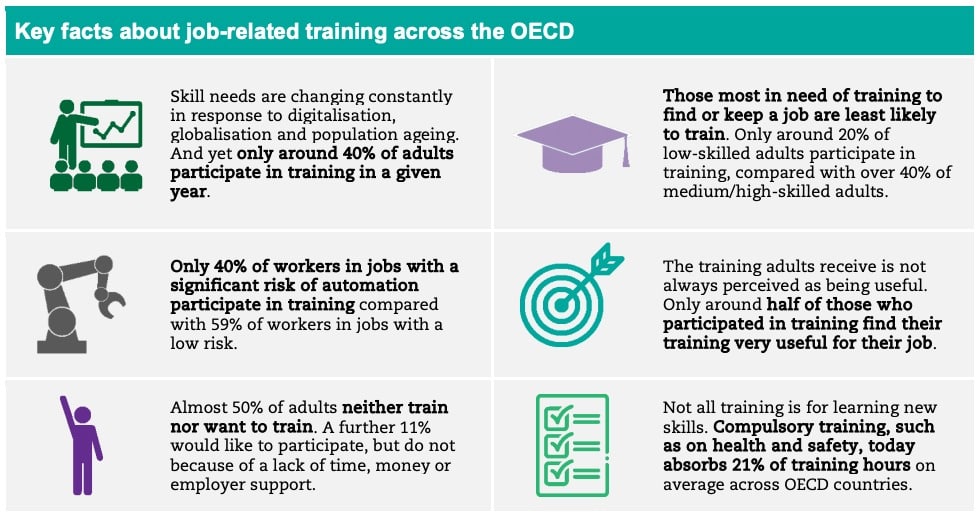A new global crisis was needed to force education, including adult education, to recognize its limitations. A quick adaptation to the new situation is not only necessary, but this time is mandatory.

The COVID-19 pandemic, for example, has increased the pace of change, with distance education putting an even higher demand on communication skills.
The “skills gap” between what employers are looking for, and the actual skill level of many job-seeking adults, has generated particular interest in adult education.
Nevertheless, while adult education has long been a “hidden” market, all that seems to be changing is its programs often being “shoved off in a corner”, says to Pearson SVP Jason Jordan.
˝The world of work is changing. We need more adult education, not less˝ said Alan Tuckett in a very interesting article published two years ago in The Guardian.
In some countries, and I will refer here strictly to Romania, although theoretically there are plans for change and modernization, adult education has been stuck in the 90s.
The legislation is outdated, with many ambiguities and many irrelevant changes, almost non-existent government investments for professional training in trades and occupations that are necessary for the real economy, and not to mention the use of huge funds for countless strategies that never leave the paper stage. Obsolete occupational standards, not updated for years, and training programs that are inadequate, are common adult education problems in Romania, problems that I believe are common to other countries as well.
On the other hand, some training providers place little to no importance on preparing for the launch of a new professional course, which just leads to the material prepared for teaching as rushed and inadequate.

There are many examples of online course providers that appeared on the market immediately after the COVID-19 pandemic was declared without being prepared for it. In their training process, the use of ZOOM or SKYPE is considered sufficient because the adaptation of the training program and teaching methods to the online environment is not even taken seriously.
However, ˝Today’s world moves very quickly˝ says Swish Goswami in his article: ˝The Next Frontier Of Education˝ noting that ˝The biggest way that the novel coronavirus has sped up the evolution of education is with the acceptance of remote learning…many businesses have had to quickly adapt to remote work, teachers, schools, students … have all had to adapt to remote education.˝
I have highlighted three current trends in adult education from Tom Vander Ark’s article, ˝10 Current and Emerging Trends in Adult Learning˝.
- Online, mobile and blended – The majority of professional adult training providers have been caught completely unprepared by the COVID-19 world crisis, with some countries taking delayed and inappropriate steps in regulating these forms of training. Some, simply did nothing. Tom Vander Ark quotes NMC Horizon Report: “If institutions do not already have robust strategies for integrating these now pervasive approaches, then they simply will not survive.”
- Better Feedback – ˝Adaptive learning systems and platforms are providing real-time feedback, and digital curriculum usually includes embedded assessments.˝ All occupational training programs, which I coordinate and train, such as Security Systems Designer, Security Consultant, or Security Manager ˝are incorporating project-based learning with authentic performance tasks.˝
- Employer partnerships – The partnerships concluded with SIEMENS Romania and Spy-Shop (distributor of security, surveillance, and monitoring equipment) with RQM Cert, the professional training provider I work for in Romania, are excellent examples of good practice. ˝A sequence of applied projects can be completed quickly by experienced learners and more slowly by workers that need more time and support.˝
To learn more about all ten trends in adult education, I recommend the source.
Clearly, the future of adult education is becoming more and more interesting.
Katie Gray gives us four reasons for this statement:
- Technology is Incredible and more and more advanced. ˝VR, AI, and simulations are not science fiction anymore, but real classroom practices.˝
- The Need for Adult Learners is Increasing. ˝Academic study has reached saturation point, leaving huge potential for tradespeople and vocational professionals to succeed. Engineers, healthcare workers, plumbers, electricians, mechanics…we need these skills.˝
- Learning is becoming a lifelong commitment (but in a good way!). ˝The workplace is faster-paced than ever before … The opportunity to learn is rife in the modern workplace – and, what’s more, many employers will pay to upskill you!˝
- Learning is only becoming more flexible and accessible. ˝The options for adult learning are infinite. … Adult learning has never been more accessible to everyone. And the future is more of the same – a world of knowledge at your fingertips.˝
Conclusions:
Key facts about job-related training across the OECD presented in ˝Future-Ready Adult Learning Systems˝.

Note: The Organisation for Economic Co-operation and Development (OECD) is collecting data to assess the future-readiness of countries’ adult learning systems, and helping countries improve their performance in the area of adult learning by providing policy directions and international good practice example.
Because of the fact that the work-life balance has changed, adult learning is inescapable. As an adult, today, it is very easy to learn. It is easy and accessible, and technology has the potential of making this extremely fun by learning online, mobile or blended.
There is a new paradigm for learning which allows a much more individualized approach to learning: computer‐based tutorial learning, which is considered particularly important for adult learning.
Online, mobile or blended courses allow you to customize your learning and you can use online learning platforms such as Coursera or Udemy, or specific courses by creators like PECB or RQM Cert. The possibilities are endless.
Sources: